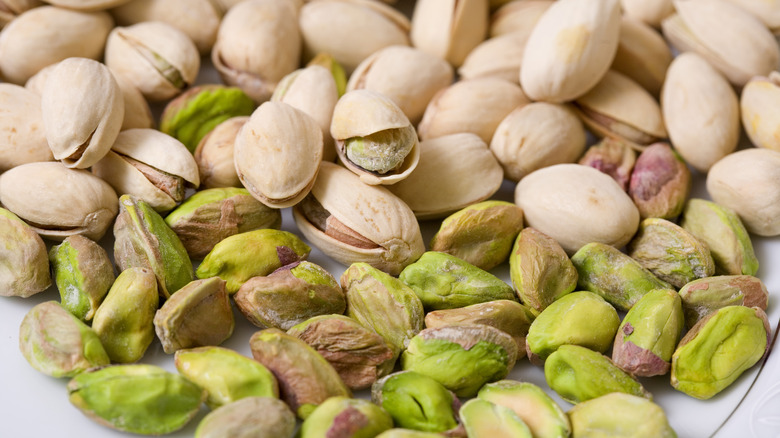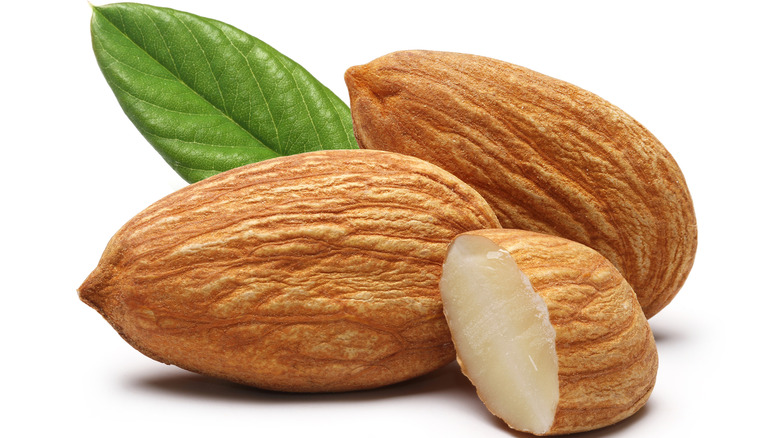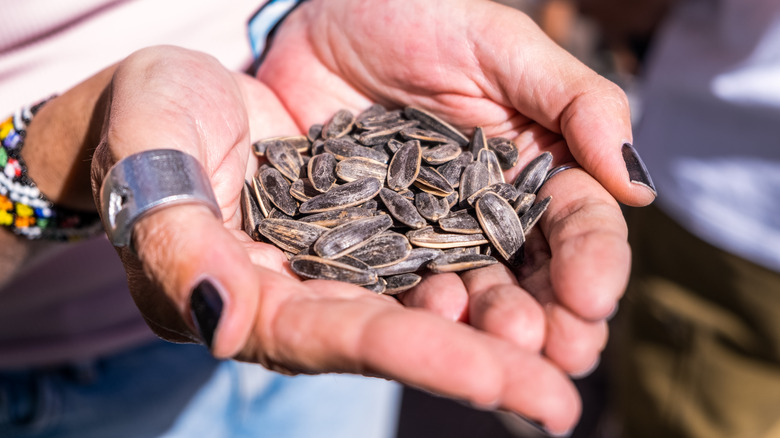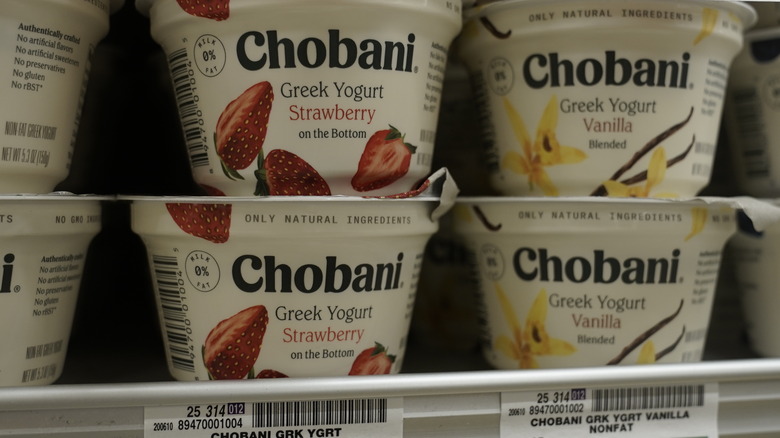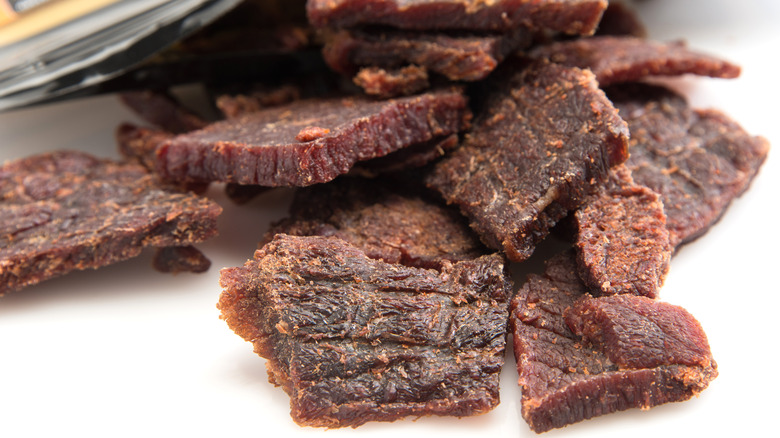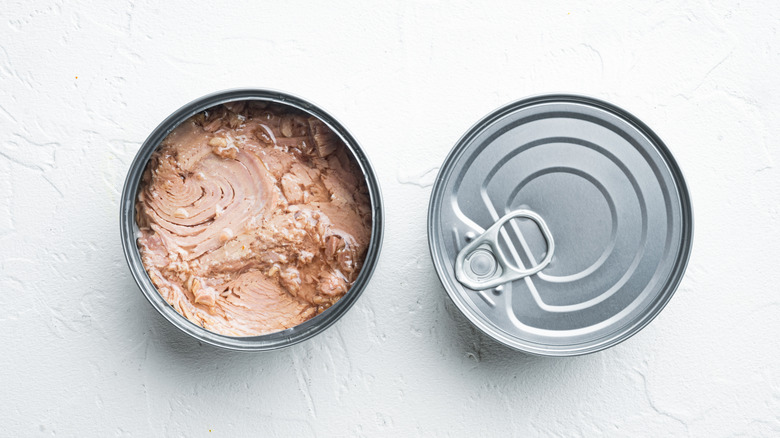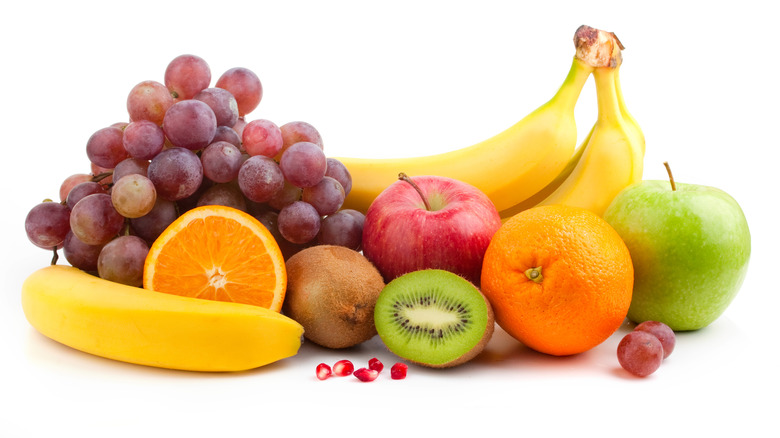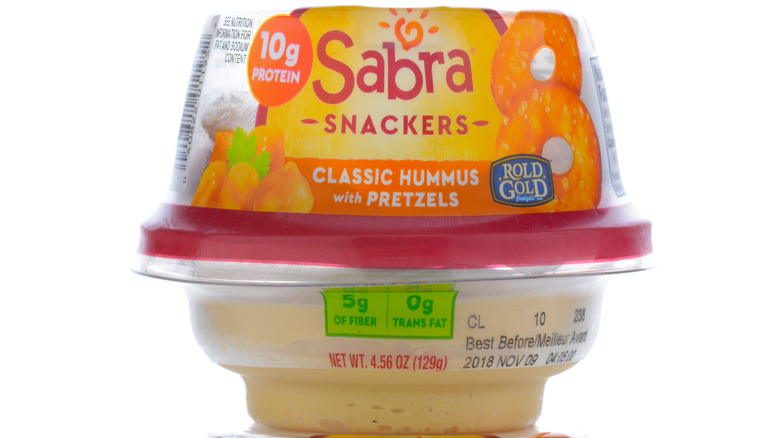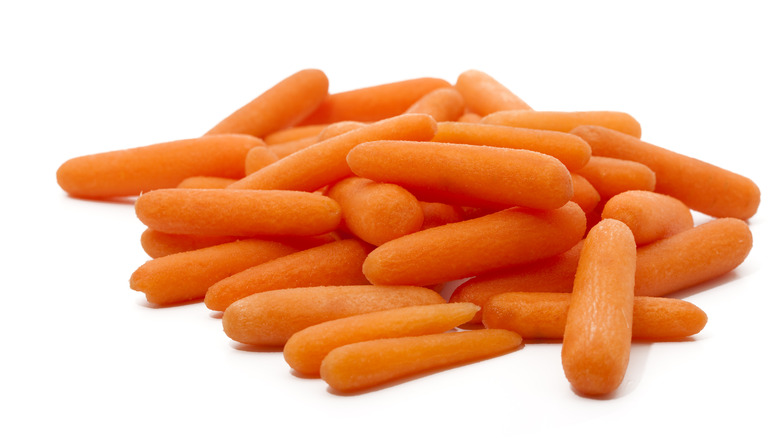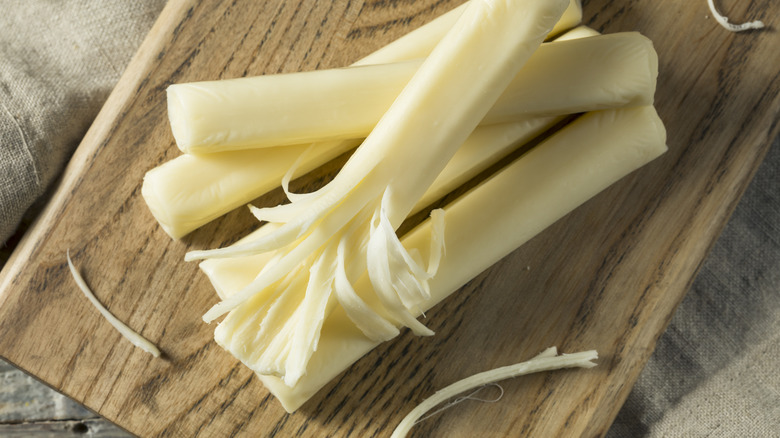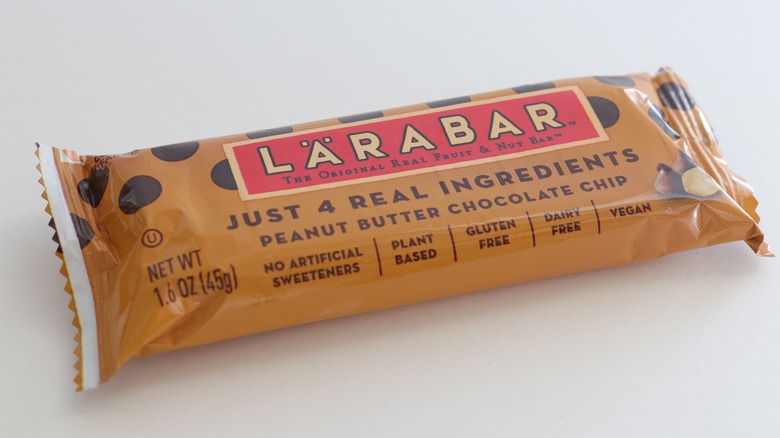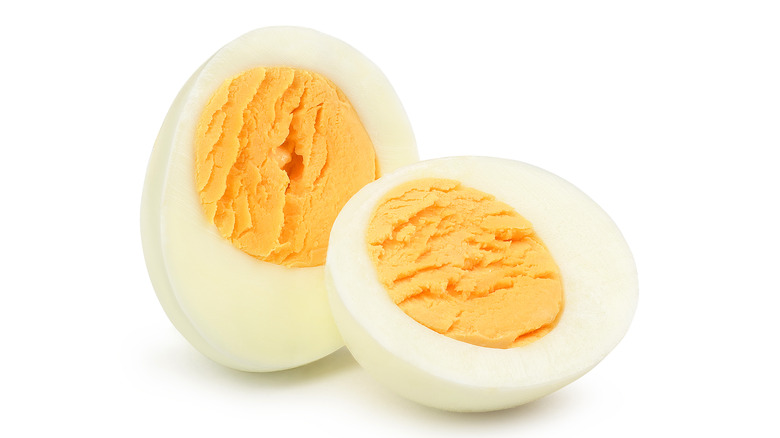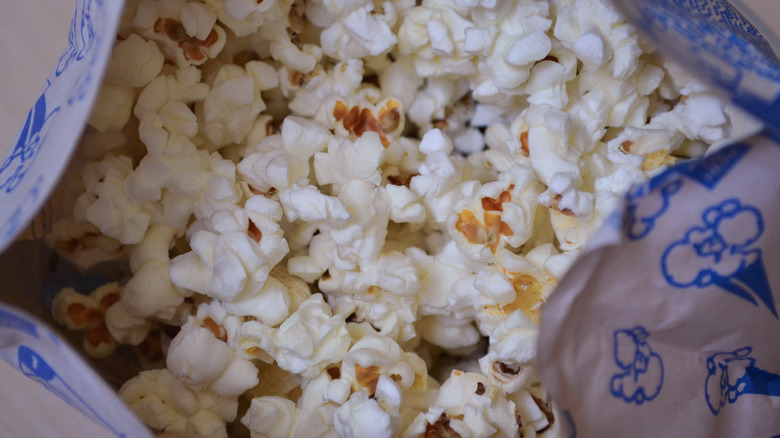The Healthiest Gas Station Snacks To Buy On A Road Trip
You're on the road and your stomach is starting to growl — the snack attack has just begun. So, you get to the nearest gas station and scope your options. Those donuts, single-serve pie snacks, ice cream bars, and chips may be easily visible, a-plenty, and certainly tempting. However, you'll be doing yourself a favor if you consider a healthier snack.
What to look for? Choose snacks that are low in added sugars — you'll benefit from reduced cravings afterward (and avoid that sugar crash). Also, reach for snacks that are low in fat and have high water content, like fruits and veggies. And, consider that protein- and fiber-rich options lend to more satiety — so you can make it to your next meal without feeling hungry.
But let's be honest, your gas station snack has to be convenient (i.e., easy to open, accessible to eat) and it has to taste good! You'll still want to focus on those satiety factors. But, to truly satisfy your taste buds, you'll want options that delight the senses — crunchy, chewy, creamy, somewhat sweet, a bit savory ... you name it. Think a crisp, delicious apple; a pack of crunchy nuts; a creamy, dense yogurt, etc.
Check out these healthy (and tasty) gas station snack options to fuel you up during your next road trip.
Pistachios
There are a wide variety of nuts you can find almost anywhere you shop, including peanuts, walnuts, cashews, and almonds. But, if you haven't reached for those bright-green pistachios, consider popping these nutrient-dense morsels into your mouth. If you find them in-shell, even better. This means you'll be doing yourself a favor by slowing down (it takes time to un-shell each individual nut). Eating slowly can help control your appetite (and how much you consume), according to registered dietitian Brian St. Pierre for Precision Nutrition. In-shell or out-of-shell, the nut's high plant-protein content means these green gems are also quite satisfying, another means of controlling your appetite. Did you know that pistachios have nearly 6 grams of protein per 1-ounce serving?
Beyond the protein, pistachios are packed with phytonutrients. They are also a rich source of unsaturated fats and dietary fiber. They are a source of vitamins E and K and several B vitamins, too. And, they are a rich source of lutein and zeaxanthin, in addition to other polyphenols, which can provide antioxidant effects.
Almonds
You may know that almonds are a healthy nibble that can satisfy your desire to crunch. A variety of nuts and seeds, including these tree nuts, are beneficial components of the Mediterranean diet. With mostly healthy fats and a bit of fiber and plant protein, almonds can be quite satiating, too.
Did you know that almonds might actually be beneficial for gut health? Consuming almonds may have a positive effect on the gut microbiota, according to a 2022 study in The American Journal of Clinical Nutrition. In fact, according to the study, eating 52 grams (2 ounces) of almonds daily may benefit your gut health by stimulating butyrate production. Butyrate is beneficial for its role in regulating the gut barrier to keep unhealthy bacteria from entering the bloodstream, thereby reducing inflammation, dietitian Allison Tallman told Medical News Today.
So, head on over to the trail mixes and variety of nuts, and seek out whole raw or dry-roasted almonds. You'll also get the benefit of healthy monounsaturated fat. And if you need help with portion control, consider the convenience of a 1.5-ounce snack pack.
Sunflower seeds
You'll likely find sunflower seeds (packed in their shells) are a common staple at the gas station. Snacking on sunflower seeds can provide that light crunch you may be vibing for. Because they are rich in nutrients, they are a good swap for those empty-calorie snack packs. What's more, they are a great option for those with nut allergies.
Yes, in-shell sunflower seeds can be time-consuming to eat — think of all those tiny seeds you have to de-encapsulate. But the good news is, it's hard to go overboard with this snack. So be sure to grab a paper bag for all those shells, especially if you are on a long road trip.
These seeds have a nutrient-dense profile, including fiber, protein, and healthy fats, in addition to a variety of immune-supportive phytonutrients, including vitamin E, zinc, and selenium. And they are quite satisfying, too. Just one ounce provides 5.5 grams of protein and 3 grams of dietary fiber. Rich in polyunsaturated fatty acids, they are also beneficial for your heart. These healthy fats help reduce your levels of LDL (bad) cholesterol, which lowers your risk for heart disease and stroke, according to American Heart Association.
Greek yogurt
Need to refuel after a long stretch of driving? Exit to the nearest gas station to fill up your tank. And, while you're at it, top off your needs with a refreshing snack. Because chances are, you may be feeling a bit peckish.
While it may be tempting, skip the single-serve ice creams and frozen treats. You can still hit the dairy section, but reach for a container of creamy yogurt, instead. Opt for Greek yogurt as it has more protein and less sugar than regular yogurt. If you chose plain and low-fat — even better. That's because, ounce for ounce, whole milk yogurt has nearly twice as much saturated fat as low-fat yogurt.
We get it. A flavored variety, such as strawberry or vanilla, may be more appealing when it comes to palatability and your sweet tooth. Just be aware that these sweeter options may contain as much as 18 grams of added sugars per 3.5 ounces of yogurt (an excess you may not need, especially if you've been sitting in a car for several hours). So, read the labels or pair your plain yogurt with fresh fruit, baby carrots, or lightly salted nuts instead.
Regardless of your choice, yogurt is a good source of protein as well as calcium, phosphorus, and vitamin D. Its healthy fats and protein will keep you fuller longer. What's more, you'll get the benefit of probiotic strains — namely Lactobacillus bulgaricus and Streptococcus thermophilus — to keep your gut healthy and happy.
Beef jerky
Beef jerky is a convenient source of animal protein that's ideal for road trips. The beef is shelf-stable (won't spoil), portable, and requires no preparation. Just peel the package open and eat. You won't even have to worry about getting your hands dirty because it's cured and dry.
True, beef jerky is a form of processed meat. As such it can be higher in sodium. Excess sodium is linked to water retention and bloat; and, over time, it can contribute to hypertension. Furthermore, sugar can be a prominent ingredient in the blend (for example, a barbecue flavor may have both sugar and high fructose corn syrup listed high on the ingredient label). The good news, however, is that you won't likely have to worry about the fat content. Since too much fat won't dehydrate well and can make the jerky spoil-worthy, it's likely most beef jerky is processed from leaner cuts of beef, according to People's Choice Beef Jerky.
When consumed as a snack, on occasion, beef jerky can be a decent option to satisfy hunger and support protein needs. For a healthy bet, be sure it is also low in added sugars, and not high in sodium. Hint: If the nutrition label has 5% DV or less sugar, it can be a reasonable option. Also, if the DV is significantly less than 20% sodium, it is not considered high in that electrolyte. Paleovalley 100% Grass Fed Original Beef Sticks have 0 grams of sugars and 10% DV in sodium, rendering them a healthier choice.
Tuna fish
These days, you can find tuna conveniently packed in easy-open packets or pull-top cans — making it a convenient gas station snack. What's more, tuna fish is a quality protein that's low in fat, a good source of B vitamins, and can help you meet your requirement of two servings of fish per week as recommended by the American Heart Association. What's more, tuna contains an essential amino acid, taurine, which may be protective against heart disease. Taurine may improve lipid levels, lower blood pressure, and have an anti-inflammatory effect, according to a 2010 review in Atherosclerosis.
Be sure to choose a safe-catch option to benefit sustainability efforts. And look for tuna that is low in mercury. That's because mercury at high levels can affect brain development in babies and young children; and it can also be harmful to adults, according to the World Health Organization.
Fresh fruit
Fresh fruit is an essential part of a healthy diet. In addition to your 5 A Day for veggies, the American Heart Association recommends four servings of fruits per day. Luckily, you can readily find apples, bananas, and oranges at your gas station.
Bananas, though known for their potassium, are a convenient source of energy-boosting carbs. But they are also a source of fiber and resistant starches, which can help slow digestion (to prevent spikes in blood sugars), according to the Harvard T.H. Chan School of Public Health. One medium banana contains 3 grams of fiber. Oranges are rich in vitamin C and also a source of calcium and folate. Because they are fresh and juicy, they are a hydrating choice as well. Apples contain both soluble and insoluble fiber, which aid in both digestive and cholesterol-lowering properties, according to Everyday Health. With small amounts of essential micronutrients, they are a great choice for your overall health.
And, while you could opt for supplements to get your daily doses of vitamin C, fiber, and essential vitamins and minerals, that's no reason to pass up on your fruit. In fact, the vitamins and nutrients in fruits (and other whole food sources) are easier to absorb than those in supplemental forms, according to Regenerate Medical Concierge. For example, you'll likely better absorb the calcium obtained from an orange because vitamin D (also found in the orange) helps boost your body's ability to absorb that calcium.
Hummus
If you eat hummus, you may know it's a great vehicle for getting in more veggies. In fact, a 2012 study in the Journal of the Academy of Nutrition and Dietetics suggests that offering a low-fat dip encourages the consumption of moderately liked — or even "bitter" — raw veggies. It pairs well with celery and baby carrots, which are also easily available at the gas station's mini-mart.
You may also enjoy a hummus snack pack with pretzels. Pretzels are a convenient carb energy source and should be consumed in moderation. That's because they are low in fiber and low in protein and not very nutrient dense. That said, the amount of pretzels found in a hummus snack pack is a small portion so you'll get your fix for that salty crunch, without eating too much.
What's so beneficial about hummus? First of all, it's tasty. If it doesn't taste good, why would you eat it? Secondly, it is comprised mostly of chickpeas. Chickpeas are a source of plant protein that is a complete source because they contain all nine essential amino acids. And they are packed with vitamins A, E, and C. Chickpeas are a good source of fiber, too! What's more, hummus is made with minimal and mostly whole-food ingredients — namely chickpeas, tahini, garlic, and salt — which means you need not worry about a lot of additives or chemicals.
Baby carrots
Who doesn't love those cute and snack-able baby carrots? They're super-convenient, easy to eat, and they pack in a crunch. And, nutritionally speaking, vitamin A is not their only asset. In fact, they've got a wide variety of nutrients including folate, magnesium, potassium, and vitamins A, C, E, and K. So, besides promoting eye health, carrots also support immunity, digestive health, and even bone integrity (per Good Housekeeping).
Did you know that carrots also contain calcium and phosphorus, nutrients important for bone health? And in addition to its keratin-boosting benefit (thanks to vitamin A), these nutrients can also benefit your teeth. In case you didn't know, keratin is an important part of the makeup of your teeth — it's enamel, according to Mulgrave Dental Group. And, getting back to that satisfying crunch, munching on whole plant foods like carrots can help cleanse and strengthen your chops.
So, chomp away! Carrots have very few calories, and yet a wealth of health-boosting potential.
String cheese
Remember that string cheese you had as a kid? Peeling it away, string after string, just makes your cheese-eating satisfaction a bit more fun. Did you know string cheese is 100% mozzarella? Yep! Despite its funny texture, it contains no artificial ingredients. The difference is in how the cheese is treated and shaped after its curdled blend of ingredients (milk, culture, and rennet) has been heated to reach a temperature of 140 degrees Fahrenheit, according to How Stuff Works. At this point, it yields a stretchy consistency. While mozzarella is then shaped into balls and placed in water or brine, string cheese is cut into strips and stretched even more — giving it a drier and stringier consistency. String cheese is also made with low-moisture milk.
Besides its all-natural ingredient profile, string cheese is a good source of vitamin B12, calcium, and protein. And it is conveniently packed into individually wrapped 1-ounce servings.
Protein bars
Not all protein bars are created equal. Yes, they may have a decent amount of protein, but some are also packed with sugar and they may be lacking in dietary fiber. A suitable choice contains 3 or more grams of dietary fiber, recommends dietitian Halle Saperstein for Henry Ford Health.
Opt for a protein bar in which sugar is not within the first few ingredients nor scattered throughout. If it contains high fructose corn syrup, skip it. Some other sugars to watch out for include dextrose, fruit juice concentrate, glucose, maltose, sucrose, barley malt, beet syrup, corn sweetener, and maltodextrin. Aim for a bar that's not too carb-heavy. A bar with about 20 grams is a good guideline. And choose one that doesn't contain too much saturated fat. Palm, palm kernel, and coconut oils are high in saturated fats — 50% to 85% saturated, according to Harvard Health Publishing. Still, they are a better choice than trans fats, which are banned. But they are not as healthful as oils that remain liquid at room temperature, like olive oil and avocado oil.
Need a good option? Larabar Peanut Butter and Jelly Fruit and Nut Bar contains 4 grams of fiber, 26 grams of carbs, and 6 grams of protein. With no oils or added sugars, it contains simple, whole-food ingredients: dates, peanuts, unsweetened cherries, and sea salt. Or if you want something a bit more dessert-worthy, consider the four-ingredient Larabar Peanut Butter Chocolate Chip.
Hard boiled eggs
Eggs are a low-cost, convenient, complete source of protein. And if you are looking for a relatively low-calorie snack that can hold you over (at least a bit), reach for that incredible edible egg. One large (50-gram) egg is just 72 calories, and yet contains 6 grams of protein. Once boiled, a whopping 91% of this protein is bioavailable — in other words: The body absorbs it quite well. In fact, the protein in eggs is satiating enough to hold you over until your next meal, according to a 2022 review in Nutrients. As such, it is a great way to curb your snacking for better weight control.
Looking deeper into the egg's nutritional value, over half the protein is found in the egg white. Also, its yolk is incredibly nutrient-dense. That golden center is a rich source of omega-3 fatty acids; contains eye-protective carotenoids, lutein, and zeaxanthin; and is a good source of vitamins A, D, and E. What's more, it is a source of choline, which is essential for brain health and functioning.
Air popped popcorn
You may be hankering for crisp and salty chips, but you'll be better off reaching for a bag of air-popped popcorn. That's because popcorn is high in fiber and a source of polyphenols, which are linked to heart and digestive health, according to the American Heart Association. And it's low in calories, too. According to the USDA, a 3-cup serving of air-popped popcorn contains 93 calories and close to 3.5 grams of satiating fiber. In fact, 2016 research published in Advances in Nutrition suggests you may find it more filling than the same amount of potato chips. You'll also satisfy those munchies because it's got that good ole crunch factor.
So, skip the buttered, caramel-coated, or other flavored varieties because saturated fats (from butter), sodium, and added sugars can add up — especially if you are consuming 3 cups or more! And go with a lightly salted version of air-popped if you'd like just a bit more flavor.


